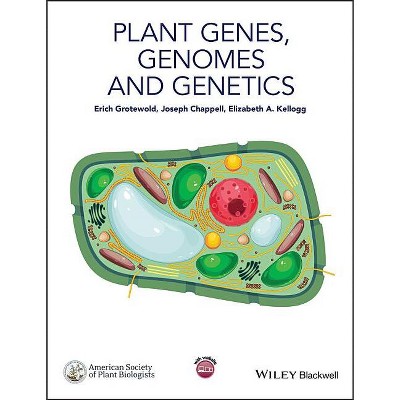About this item
Highlights
- Now updated for its second edition, Population Genetics is the classic, accessible introduction to the concepts of population genetics.
- About the Author: MATTHEW B. HAMILTON, PHD, is Associate Professor of Biology at Georgetown University, where he teaches Population Genetics, Molecular Evolution, Evolutionary Processes, and similar undergraduate and graduate level courses.
- 496 Pages
- Science, Life Sciences
Description
About the Book
"Population genetics describes the distribution of alleles in a population with regard to evolutionary processes and population structure. It is the cornerstone of modern evolutionary biology, with wide applications in fields such as conservation biology, health-oriented clinical research, bioinformatics, animal and plant breeding, and molecular biology. Population genetics can also be used as a vehicle to introduce science majors to processes of abstraction and modeling common to any field of science"--Book Synopsis
Now updated for its second edition, Population Genetics is the classic, accessible introduction to the concepts of population genetics. Combining traditional conceptual approaches with classical hypotheses and debates, the book equips students to understand a wide array of empirical studies that are based on the first principles of population genetics.
Featuring a highly accessible introduction to coalescent theory, as well as covering the major conceptual advances in population genetics of the last two decades, the second edition now also includes end of chapter problem sets and revised coverage of recombination in the coalescent model, metapopulation extinction and recolonization, and the fixation index.
From the Back Cover
A CONCISE INTRODUCTION TO THE CONCEPTS AND APPLICATIONS OF POPULATION GENETICS, FROM FIRST PRINCIPLES TO BASIC MODELING AND SIMULATION
Population Genetics, Second Edition, provides an up-to-date introduction to the foundation of modern evolutionary biology: the study of the distribution of alleles in a population in relation to evolutionary processes and population structure. Designed for a full one-term course on population genetics, this accessible college-level textbook integrates foundational conceptual approaches, classical hypotheses, and traditional debates to help students understand a wide range of empirical studies based on the first principles of population genetics. In addition to gaining conceptual knowledge, students also develop algorithmic and computational skills that are central to prediction and data analysis in quantitative biology.
This fully revised edition includes updates on topics such as effective population size, mutation rates and models, recombination in the coalescent model, measures and models of population differentiation, population assignment methods, and models of linked nucleotide site variation. New end-of-chapter problems include numerical and conceptual problems, applications using published data, and exercises that utilize simulation software.
This popular textbook:
- Presents a comprehensive body of materials that support an innovative approach to teaching population genetics
- Describes the major conceptual advances in population genetics of the last two decades
- Is richly illustrated and includes numerous examples and case studies
- Offers a range of explanatory styles designed to engage different types of learners
- Features a highly accessible and thorough introduction to coalescent theory
- Provides step-by-step explanations of the mathematics required to understand the concepts covered in the text
- Includes boxes with in-depth mathematical derivations and reasoning
- Features Interact Boxes with exercises based on a rich set of spreadsheet models and web-based computer simulations built specifically for the text
Population Genetics, Second Edition, is the perfect textbook for advanced undergraduate and graduate students in biology, genetics, ecology, evolutionary biology, agricultural genetics, molecular biology, and population-oriented medical genetics, and a valuable resource for other advanced students and practitioners wanting to expand their knowledge in population and evolutionary biology.
About the Author
MATTHEW B. HAMILTON, PHD, is Associate Professor of Biology at Georgetown University, where he teaches Population Genetics, Molecular Evolution, Evolutionary Processes, and similar undergraduate and graduate level courses. He is founding Director of Georgetown's Environmental Biology undergraduate major, past Director of the Georgetown Environment Initiative, and currently conducts research on the processes that influence the distribution of genetic variation within species.







